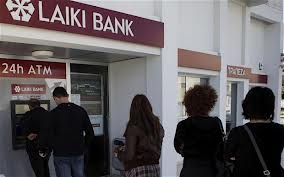Speculation is abound with all eyes on the future of the forex and binary options sector in Cyprus following the weekend’s events surrounding the troubled Cypriot economy and its proposed bailout, which includes the imposition of a levy on deposit accounts held with Cypriot banks.
The European countries are not exactly unfamiliar with bailouts, however in the case of Cyprus, there are a host of different circumstances to consider. Unlike the bailouts of other failed economies in the European region, this particular bailout comes with a proposed plundering of private and corporate bank accounts on the following basis:
Irrespective of the provisions of any other Law, every credit institution in the Republic proceeds to the collection of levy on deposits as follows:
(a) For every Euro up to 100,000, with a factor of 6.75%,
(b) For every Euro over 100,000, with a factor of 9.99%.
The levy is calculated based on the deposits in credit institutions in the Republic on the 17th Mar 2013, and withdrawals across Cyprus have been prevented in order to ensure that the government can impose the levy.
Apart from very special cases, including bank miscalculations, or upon request of written permission from senior government officials, all accounts are subject to this levy.

Customers rushed to banks in Cyprus
over the weekend to attempt to withdraw their funds
As an island nation, the country has enjoyed a degree of prosperity since it gained independence, and became a favorable location in which to establish financial sector business due to comfortable tax laws and simplified bureaucracy, and has become a veritable hub for forex and binary options companies.
Cyprus-based forex & binary options brokers have set up their regulated business entities in Cyprus since the country is a strategic geographical crossroads between international markets in Europe and the Middle East with an infrastructure that supports such corporate structures.
Many brokers have established their head offices in Cyprus, and at present the Cypriot regulator CySEC has 60 applications in process. Some of the attractive aspects include:
The country encompasses considerable forex and binary options industry expertise, and the financial authorities’ rulings apply and conform to the regulatory requirements of the European Union in relation to the full conduct of business.
The real business nature of the Cyprus based forex and binary options hub may not necessarily go hand in hand with the ethos of the Cypriot banks, therefore creating a possible unhappy marriage, especially at this time of divestment from the island when the banks are in need of funds and are concerned about firms seeking alternatives.
It is wise for the purpose of reference to look at supervised operational setups, appropriately established and functional, which handle funds and transactions between international client-traders and the forex/binary Liquidity markets, without necessarily routing all the aforesaid through Cyprus banks. The latter business may even have minor dependency on Cypriot banks.
Currently, an “if, what and when" scenario surrounds Cyprus Brokers with regard to the scenario surrounding the proposed levy on Cyprus banks’ deposits:
The possibilities may include:
(1) Brokers may incur reduction (say max 10%) in the PART of their own capital maintained in Cyprus banks.
(2) Brokers may incur reduction (say max 10%) in the PART of their clients’ funds maintained in Cyprus banks.
Execution and Conduct of Business:
First of all, the presently pending and unrealized scenario of the levy could become inflated in such a way to raise fears surrounding Cyprus brokers’ transaction execution capability, which may remain unaffected, as in most cases the latter is based on functional channels of forex interbank/inter-broker liquidity in line with the rest of the international market.
Furthermore, brokers who will need to pay trading profits to clients will likely have to bear the costs themselves in order to transfer the full amount of the profit withdrawal.
Companies’ Own Operational Capital:
The effect on this part may be smaller, possibly even minor, the more diversified the Cyprus Broker is in this respect. A point of speculation however is that brokers have to keep the minimum capital requirement in their accounts to meet CySEC regulations. This will most certainly be affected.
It would be in CySEC’s remit to act on any depletion of this account, however brokers will be obliged to make that up by funding it further from other sources, which the brokers will no doubt be reluctant to do as this will then be subject to the levy, resulting in a potentially huge cost.
Companies which hold their own funds in counterparty institutions and banks internationally for the purpose of its operations will reduce exposure and even temporary shortfalls of own operating capital may not necessarily imply cessation of operations but will be a hard hit to take.
Client Deposits and Withdrawals:
The effect on this part may be less severe, the more diversified the Cyprus Broker is in this respect; maintaining Client funds in segregated counterparty & bank accounts in EU or elsewhere as applicable.
Should the possible levy affect the said balance in Cyprus banks, this does not necessarily imply Cyprus Brokers being in a position of default in relation to client funds. The extreme scenario of a Cyprus (or other EU) Broker not being in position to respond to its obligations is coupled with activation of the Investor Compensation Fund mechanisms to compensate investors (traders) in accordance with applicable present limits.
Denting the reputation of a nation’s banking system usually results in client insecurity, and in some cases bank runs. Of further interest will be the number of clients who will withdraw their funds from the accounts of Cypriot brokers and cease to trade with them, thus creating the forex industry’s first “broker run”. Times they are a-changing.
Legal interpretations were provided courtesy of Costas Constantinides, Partner and Director at 360 Consulting, a professional services and management consultancy which specializes in engagements in international licensing, establishment and operational developmentfor forex, CFD and binary options companies in Cyprus.











